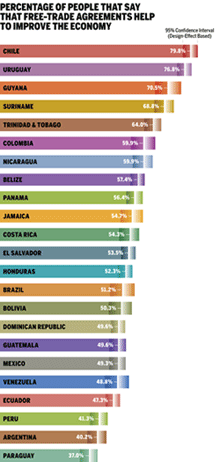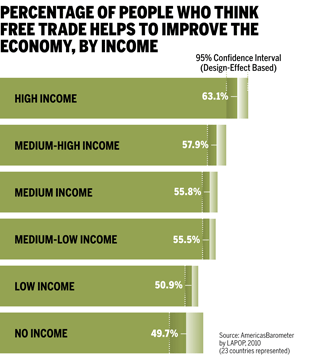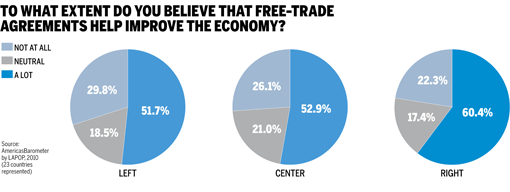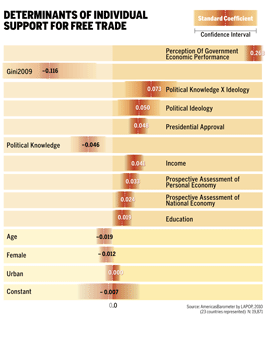Check back to AQ Online for an interactive charticle with this information.
At the core of the “Washington Consensus,” the package of free-market policies popular among Western economists in the 1990s, was strong support for free trade. However, the extent to which this “consensus” extended beyond leaders of advanced industrial democracies and international lending agencies has remained unclear. Free trade has been the target of mass protests, some of which have turned ugly, such as the violent riots during the World Trade Organization ministerial conference in Seattle in 1999. Yet do the protestors represent the norm of public opinion, or are they just extreme outliers? What is the state of public opinion today in the Americas regarding free-trade agreements, and what factors help explain differences of opinion?
In 2010, Vanderbilt University’s Latin American Public Opinion Project (LAPOP) set out to answer these questions. In its AmericasBarometer survey, which involved interviews with more than 40,000 individuals from 26 countries in North, Central and South America, LAPOP asked respondents about the extent to which they believe free-trade agreements are good for the economy. On average, they found wide support for free trade but also significant variation across countries. The variation can be explained partially, though not entirely, by findings that income inequality within a country is directly and negatively correlated with support for free-trade agreements.
LAPOP’s goal was to determine which factors at the individual level predict positive assessments of free-trade agreements. Classical theories linking economic insecurity to economic liberalization focus on an individual’s sector of employment and skill set. For example, one model predicts that those countries that possess relatively abundant advantages for production (e.g., low-skilled workers in developing countries or high-skilled workers in advanced, industrialized countries) will benefit from trade liberalization as the demand-supply ratio tilts in their favor. Another posits that individuals with high skill levels are better able to adjust to changing economic circumstances—such as new trade policies—because their skills allow them to move from one job to another.
LAPOP, however, found only marginal differences in attitudes toward free-trade agreements within the region by education level (a widely-used proxy for skill set); and even these differences narrowed when controlling for other variables.
Far more significant influences at the personal level include political ideology and individuals’ economic circumstances—both current and projected. People with right-wing or conservative ideologies are more likely to approve of free-trade agreements. And as income level, perceptions of government economic performance, and expectations of personal and national economic growth increase, so does support for free trade.
Overall, the LAPOP results suggest that economic rationality influences opinion on free-trade agreements across the Americas. To the extent that individuals stand to benefit—for example as consumers—from free-trade agreements, they lend their support to such policies. However, as individuals find that their countries suffer deleterious macro-economic consequences—such as inequality—from free trade, average support decreases.
The Public Speaks
In the 2010 round of the AmericasBarometer survey, LAPOP asked respondents in Latin America and the Caribbean the following question: “To what extent do you believe that free-trade agreements help to improve the economy?” Respondents indicated their position on a 1 (not at all) to 7 (a lot) scale. By calculating the percentage of individuals in each country who selected 5, 6 or 7—indicating positive assessments of free-trade agreements—LAPOP could assess the percentage of free-trade supporters in each country. It found that a higher percentage of respondents think positively of free-trade agreements in Chile (79.8 percent) and Uruguay (76.8 percent), while lower levels of support exist in Paraguay (37.0 percent) and in Argentina (40.2 percent). In contrast, according to The Pew Research Center for the People & the Press (2009) and Gallup (2009) polls, around 52 percent of the U.S. public1 and 51 percent2 of the Canadian public think that free-trade agreements have been positive for their respective countries.

By Income
In his 2009 book, The Market and the Masses in Latin America, Andy Baker of the University of Colorado argued that assessments of the benefits of free trade are influenced by an individual’s capacity to participate in, and profit from, the free market as a consumer of freely traded, lower-priced goods. The expectation is that people who are in better positions as consumers will be more supportive of free trade, regardless of their skills sets or other factors. The chart (right) shows that as income increases so does the percentage of people with positive attitudes toward free-trade agreements. The results are similar when a variable measuring ownership of consumer goods is substituted for income. While just 49 percent of those at the lowest income levels in the Americas believe that free-trade agreements help the economy, 63 percent of the people in the highest income ranking say that free-trade agreements are positive. As a point of comparison, data from Pew surveys reflect the same tendency in the United States, where support ranges from 46 percent in the lowest income to 49 percent3 in the near to highest income level, although the shift in the U.S. is much smaller than it is hemisphere-wide. Baker’s argument, then, receives strong support from these findings.

Political Ideology
A third factor affecting attitudes toward free trade is political leaning, which reflects people’s predisposi-tions as well as the type of information an individual receives and is likely to agree with. Historically, but with some exceptions, left-wing parties and elites in the Americas have opposed free-market reforms, while right-wing parties and elites have been more accepting of the Washington Consensus. The charts (below) present findings consistent with this trend. Respondents’ opinions of free-trade agreements can be explained, at least to some degree, by their self-identified ideological leanings. While 51.7 percent of left-leaning individuals think free trade helps the economy, 60.4 percent of right-leaning individuals think so.

Support for Free Trade
To further probe the findings linking income and ideology to opinions on free trade, LAPOP constructed and analyzed a multiple variable regression model. This table (right) presents the independent variables at the individual and country levels. To capture individuals’ economic circumstances, the following variables were included: future expectations of the national and personal economy, perceptions of the incumbent government’s economic performance, and household income. To capture the political side of the equation we included presidential approval, political ideology, political knowledge, and the interaction between political ideology and knowledge (to test whether more politically sophisticated individuals assign more substantive content to ideology). Controls included age, education, sex, and urban/rural setting. The Gini index was introduced to measure the effect of income inequality on countries’ mean level of support for free trade.4
The rows depicted in the table are ordered according to the magnitude of these variables’ relationship to the dependent variable, support for free trade. Perception of government economic performance is seen as having the strongest effect on public support for free trade. Other indicators, of an individual’s potential to participate in the economy and profit as a consumer, are also positive and statistically significant. All else being equal, a more right-wing ideology is linked to greater support for free-trade agreements than a left-wing ideology. Moreover, the effect of political ideology on attitudes toward free trade is magnified at greater levels of political knowledge.
Finally, the analysis suggests that macroeconomic conditions are related to mean levels of support for free-trade agreements. Specifically, as inequality within countries increases, support for free-trade agreements decreases.




